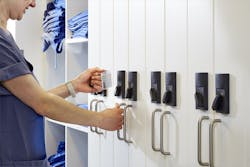Keyless Security for Medical Offices
Keeping patient data secure is a serious concern for medical professionals. Traditional lock-and-key systems do very little to help manage this problem, and create additional issues of their own. “Fortunately, wireless access control — a keyless alternative — eliminates the need for traditional physical keys while providing a higher level of security and centralized control,” says Cliff Brady, Salto Director of Industry Sectors Engagement, North America. Let’s explore how that works.
The Challenges
Controlling access to medical office spaces through the use of traditional keyed locks presents distinct challenges. When there are changes, either to staff or to their permissions, retrieving and reissuing keys can become a time-consuming and potentially problematic endeavor.
The American Medical Association states that physicians have an ethical mandate to guard patient information and only disseminate it with patients’ permission. In addition, the U.S. Health Insurance Portability and Accountability Act (HIPAA) and the European Union’s General Data Protection Regulation (GDPR) laws establish limits on who can access private health information. Penalties and fines for violations can be severe, even when a breach is accidental. With so much at stake, both for patients and healthcare practitioners, physical security for medical office facilities is of utmost importance.
However, these buildings tend to be accessible to many different individuals throughout the business day. With the boom in buildout of medical office spaces, more doctors, nurses and patients are moving through these facilities than ever before, and not everyone should be permitted in every area.
A Better Way to Manage Physical Security
Brady notes that keyless locking systems can greatly enhance compliance. Instead of mechanical locks, battery-powered electronic locks can be installed, and these do not require complicated wiring. “This system screens individuals for authorized access using established credentials, protecting patient privacy and confidential information,” he says. Users can only open doors to their permitted zones; this is accomplished by using a single remotely programmable key fob, or by an app on an electronic device, such as a tablet or cellphone.
Keyless systems also allow administrators to track who accessed which areas of the building and when. “This provides an audit trail and affords effective tracking of staff activities,” says Brady. He adds that access management is easily granted or revoked for individuals or groups as needs dictate, and this process can be managed remotely. “This is particularly useful for medical practices that have multiple locations and offsite facilities,” he adds.
In emergencies, wireless access control systems like Salto’s provide safe and efficient egress with panic bars for easy opening of doors. A monitoring feature also notifies the administrator if a door is accidentally left open or if there are unauthorized access attempts. In a situation requiring a lockdown, Salto Space technology can quickly secure the premises, restricting or preventing access altogether.
Infection Control Benefits
Wireless access control doesn’t only protect the physical premises of medical offices and sensitive medical data; it is also important in protecting patients’ health. Brady says, “This technology goes beyond controlling access to physical spaces in the interest of regulatory compliance. Infection control can also be better managed by limiting access.”
For example, the recent Covid-19 epidemic created the need for contact tracing within patient populations. The data provided by electronic access control supported these tracing efforts by collecting data on who had been in the proximity of infected individuals and monitoring their exposure risks.
Impact Felt Across Entire Facilities
A keyless access system can assure medical practitioners that they are helping prevent data breaches and the spread of infectious disease. Having quick access to various parts of the building without needing to manage physical keys also makes them more efficient.
Facility administrators can track arrival and departure of staff and vendors, immediately grant and revoke access from wherever they happen to be, and ensure the building is compliant with regulations.
Patients can rest easy, knowing that their data has an extra level of protection by limiting access to unauthorized individuals, and that they are protected against disease by an extra element of physical security.
Brady adds, “Wireless access control also allows management to analyze patterns such as occupancy levels for the purposes of optimizing resource allocation, to identify high-traffic areas, and to adjust workflows and resource planning accordingly.”
The benefits of keyless access systems like Salto’s include improved compliance, greater convenience, better patient safety and enhanced physical security.

